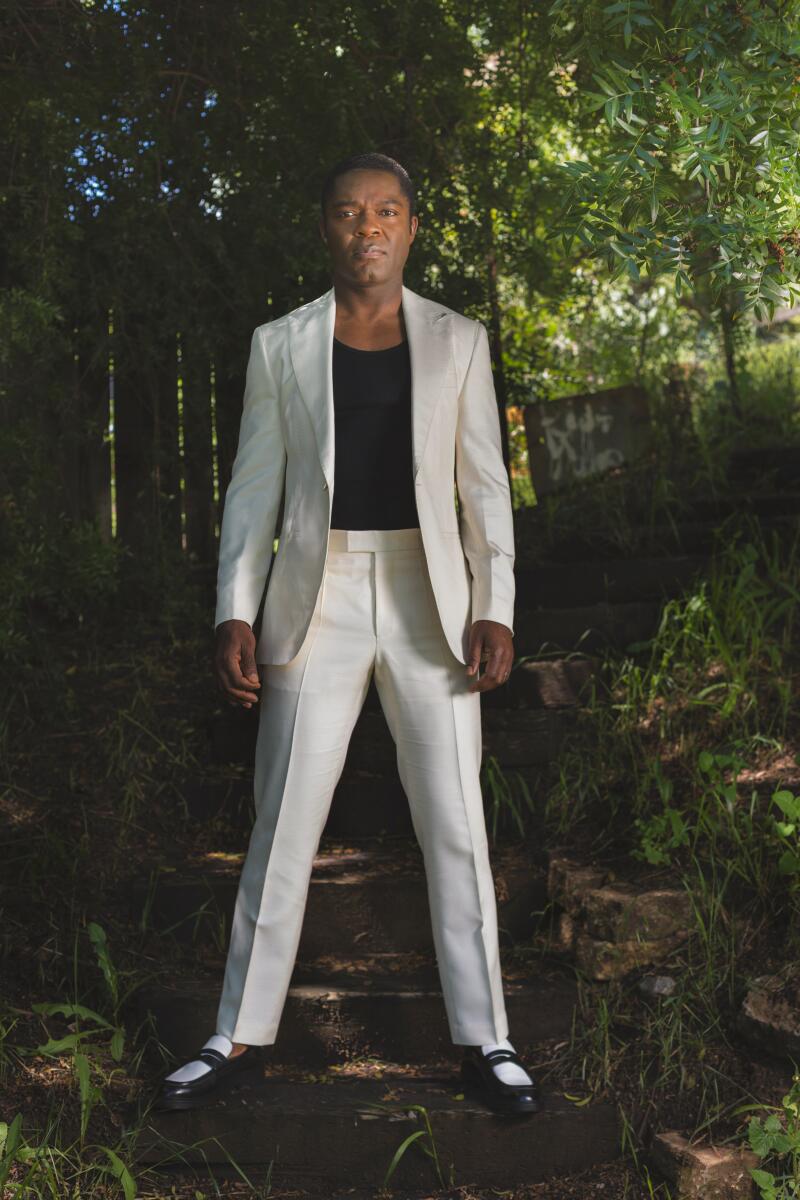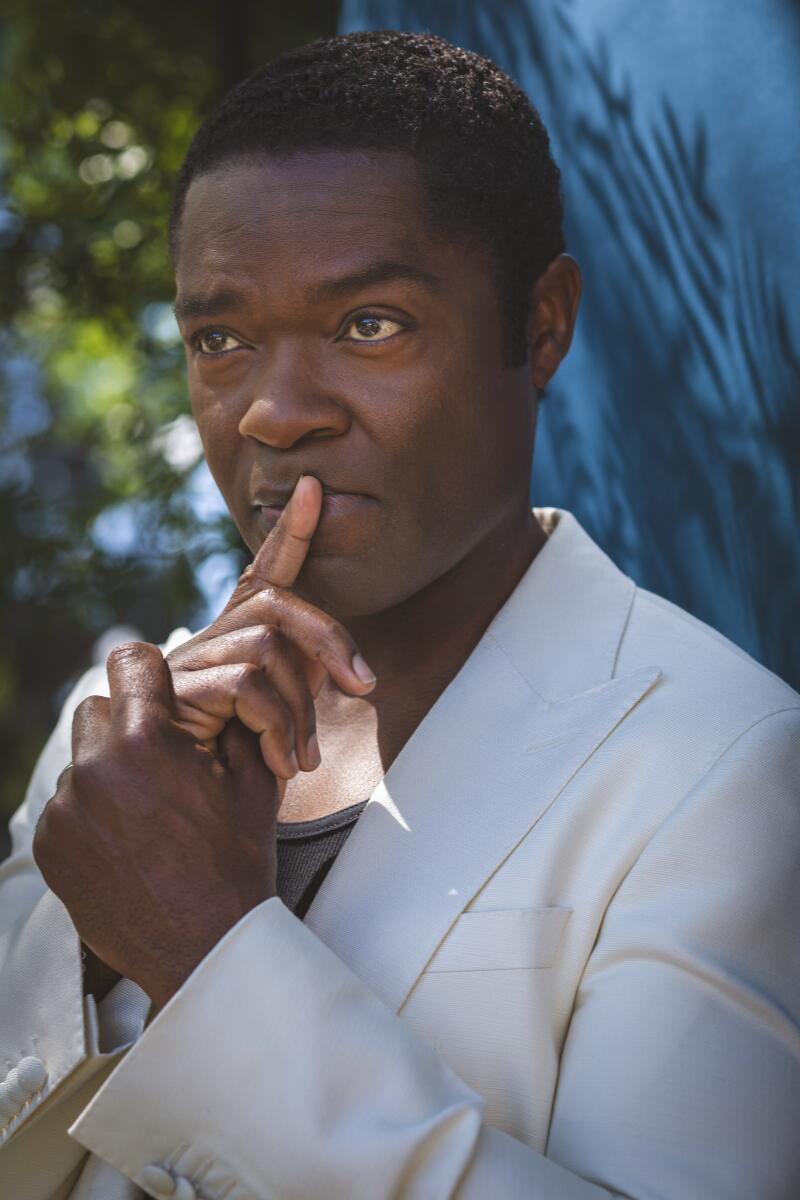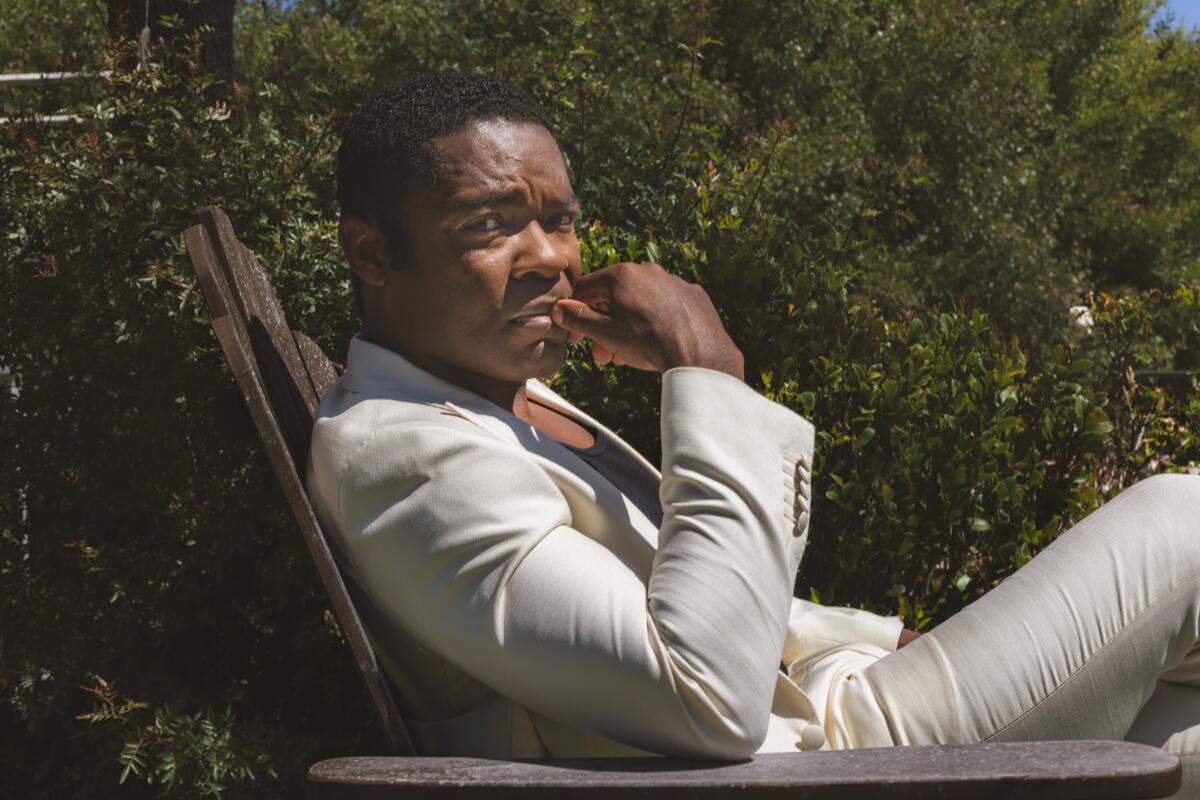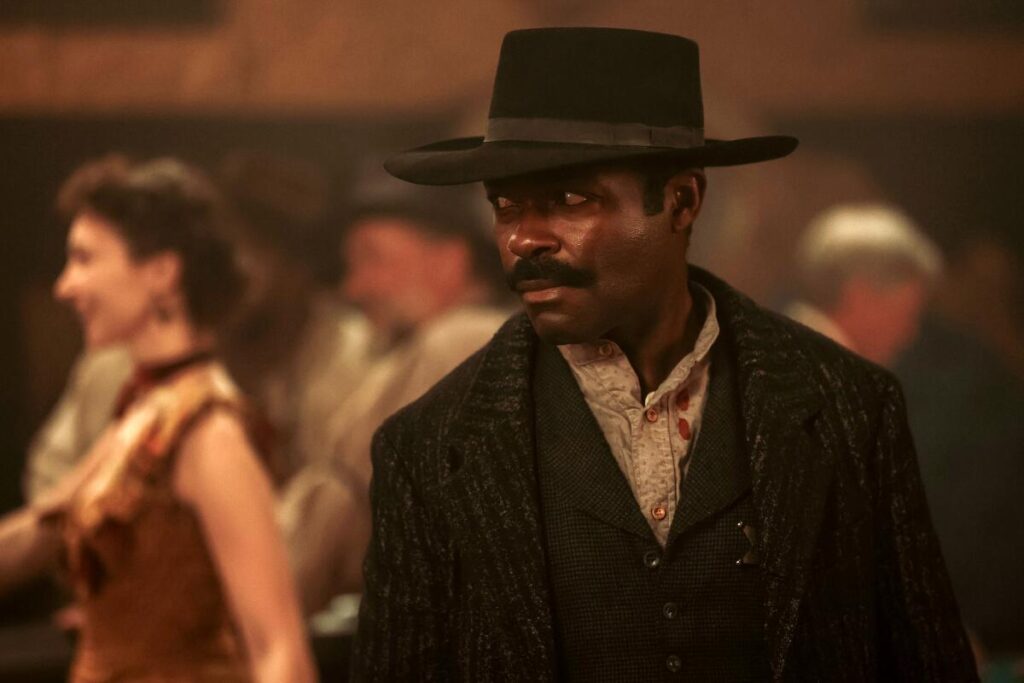When David Oyelowo, compact and composed in his white suit, sits on the throne-like chair outside his hilltop house, it’s easy to picture him as the king of Tarzana. After all, Oyelowo’s grandfather had been a tribal king in Nigeria. The British-born actor played King Henry VI in a Royal Shakespeare Company production at age 25, then portrayed the Rev. Martin Luther King Jr. in his 2014 breakthrough film, “Selma.”
Now enjoying the fruits of the six dozen or so movies and TV shows he’s made since moving to L.A. in 2007, Oyelowo reigns over a San Fernando Valley fief that includes a second house for his production company to the north, a vacant lot to the south, three dogs, four children and actor wife Jessica, whom he met as a teenager performing in “The Threepenny Opera” shortly before enrolling at the famously rigorous London Academy of Music & Dramatic Art.
On a recent afternoon, Oyelowo’s enjoying his moment in the sun a few months after completing a tough six-month shoot in Texas. There, he produced and starred in “Lawmen: Bass Reeves,” dramatizing the real-life adventures of a slave turned U.S. deputy marshal from Arkansas who caught frontier outlaws during the Reconstruction era. The show debuted last fall on Paramount+ and quickly set a record as the streamer’s most watched global series premiere. It only took Oyelowo eight years to get there.
“When I was first made aware of Bass Reeves in 2014, it seemed completely unconscionable that we hadn’t had a major movie or TV show about this great western story alongside Wyatt Earp and Butch and Sundance and Billy the Kid,” Oyelowo says later in his office. “So that’s where the obsession began.”
Teaming with producer David Permut, Oyelowo in 2015 pitched a Bass Reeves project to networks and cable companies. “Everyone turned us down,” he recalls. “The overwhelming narrative was: ‘No one is doing westerns, they’ve had their day.’ So we thought: ‘OK, I guess we’re the only ones who feel this way about Bass Reeves.’”
Playing Bass Reeves is “the hardest thing I’ve ever done, physically, emotionally, mentally,” says David Oyelowo.
(Lauren Smith/Paramount+)
Two years later, Oyelowo tried again. “Pierce Brosnan was making a western, so were the Coen brothers; there was a show called ‘Godless.’ This time the rejections were peppered with the notion that now everyone is doing westerns, so we’re not doing it.’ When the dust settled, [I realized] the reason why Bass Reeves’ story hadn’t been told could only be rooted in the color of his skin.”
Then came the 2018 blockbuster “Black Panther,” followed by Taylor Sheridan’s hit western “Yellowstone,” and everything changed. Describing Sheridan’s role as a “Bass Reeves” executive producer, Oyelowo says, “Taylor didn’t write ‘Bass Reeves,’ didn’t direct it or produce it on the ground, so to speak, but he put the western at the forefront with ‘Yellowstone’ being the No. 1 show in America, and his advocacy is what got this thing made.” Oyelowo also notes, “In the wake of George Floyd’s murder, we were trying to do better as a country when it comes to representation of people of color, so there was this perfect storm where it felt like now was the time for this show.”
Once “Lawmen: Bass Reeves,” created by showrunner Chad Feehan, got the greenlight, Oyelowo prepared for the title role by upgrading his horsemanship skills and studying 19th century recordings of former slaves. Working with dialect coach Denise Woods, he imbued Bass Reeves with a raspy drawl grounded in the character’s occupation and fatigue. “He was a failed farmer for 10 years, so given the amount of dust Bass Reeves would have inhaled doing that work, the voice goes down to here,” he says, motioning to his chest and suddenly sounding like a different person. “Every time I open my mouth as Bass Reeves, I am not me.”


David Oyelowo stars in “Lawmen: Bass Reeves.” (Jason Armond / Los Angeles Times)
Citing Daniel Day-Lewis, Christian Bale and Jeffrey Wright as exemplars of full-immersion acting, Oyelowo says, “I love what I do as an actor with a character like Bass Reeves, because the way he walks, the way he talks, the way he thinks — everything about him, outside of his values about family and justice, is different.”
“Bass Reeves” started production in early 2023. “It’s the hardest thing I’ve ever done, physically, emotionally, mentally,” Oyelowo says. “It’s incredibly cold weather in January, and by the time we were done around about June, people were having heatstroke. We also had to battle two strikes. I was in nearly every scene. It was early starts — 5 in the morning, you’re on horses. But every time you want to throw in the towel, I was overwhelmed by the blessing of finally getting to tell this story.”
The series tracks eight episodes of nonstop turmoil starting with the 1862 Battle of Pea Ridge, when the enslaved Reeves is forced by his master (Shea Whigham) to fight for the Confederacy. Reeves later flees to Indian Territory and settles down with a Creek woman on a drought-afflicted farm. A grizzled deputy (Dennis Quaid), noticing Reeves’ marksmanship and fluency in Native American languages, recommends him to “Hanging Judge” Isaac Parker (Donald Sutherland), who deputizes Reeves to ride into the frontier and capture criminals.
Reeves’ most problematic arrest: Jackrabbit Cole (Tosin Morohunfola), a Black man charged with killing a sadistic white rancher. “For me,” Oyelowo says, “the show is very much built around the oily, nebulous, slippery, constantly-being-redefined notion of what justice meant in this country at that time. Bass Reeves is representative of the contradiction that is America.”

David Oyelowo at his home in Los Angeles in April.
(Jason Armond / Los Angeles Times)
Oyelowo and his team cast a majority Black ensemble, including the deputy’s hardy wife, Jenny Reeves (Lauren E. Banks), along with Native American Forrest Goodluck in the role of rascal sidekick Billy Crow. Oyelowo made sure he populated the series with Black and brown faces as a better-late-than-never corrective to the Hollywood-warped versions of history he absorbed as a child living in a South London public-housing council estate. “When I was 6 and 7 and 8, I loved watching westerns, but there was no one like Bass Reeves on my screen,” Oyelowo says. “For 6-year-old me, every time I aspired to be a cowboy, I’d be doing that through the filter of being a white person. Subconsciously, that’s telling you that you’re peripheral.”
Front and center on the wall behind him is the graphic realization of a childhood dream deferred. It’s a “Bass Reeves” poster of Oyelowo rearing back on a beautiful white horse in grand cowboy style. He says, “I’ve had so many people thanking me for ‘Bass Reeves’ because their kids are growing up in a world where seeing a Black cowboy has become normalized. When I finished ‘Bass Reeves,’ the overriding feeling, the exhale, was relief: It now exists.”

